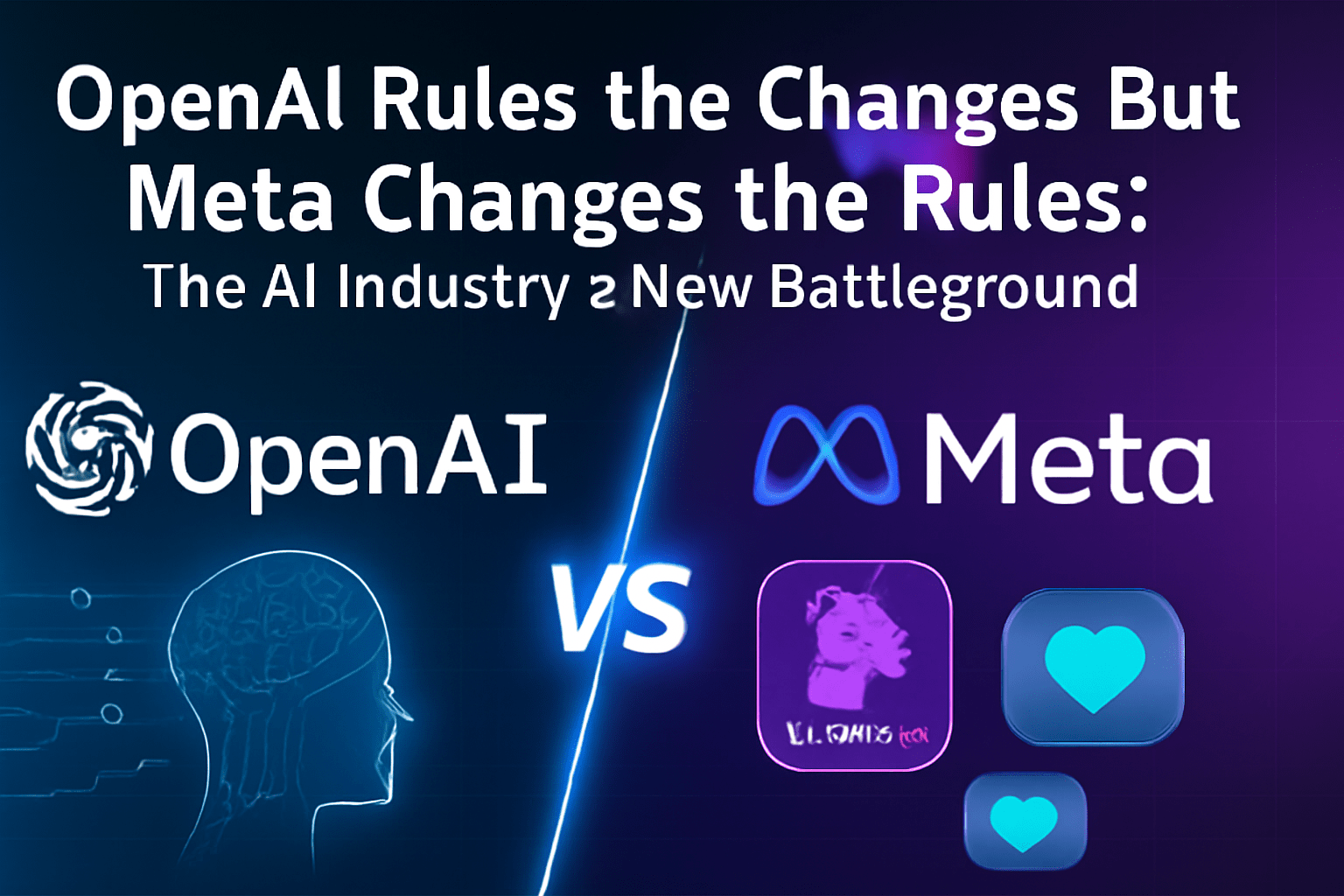OpenAI Rules the Changes But Meta Changes the Rules: The AI Industry's New Battleground

In the rapidly evolving world of artificial intelligence, two titans are now at the forefront of a transformative battle: OpenAI and Meta. Each has its own strategy, vision, and approach, but recent developments suggest that Meta is not just challenging the status quo—it’s changing the rules of the game entirely.
Meta has made a bold move by releasing the smaller versions of its Llama 3 family (8B and 70B-parameter dense models) and teasing the upcoming larger version, a 405B dense model. Although this larger model is still in training, it’s already showing GPT-4-level evaluation scores. What’s more, Llama 3 is open access, meaning that this GPT-4-class model is available for anyone to use. This move represents a significant threat to OpenAI, which has so far led the industry by selling access to its private models via API.
Meta vs. OpenAI: A Forced Dichotomy
While it's tempting to view this as a simple "Meta vs. OpenAI" conflict, the reality is more complex. Startups like Mistral and Cohere never truly stood a chance against OpenAI, which has largely dictated the direction of the industry. However, Google and Anthropic are also worthy rivals, each with its own challenges and strategies.
Google, which funded much of the early research in generative AI, now finds itself in a paradox. The very technology it helped create is now a potential threat to its core business: ads-based search. While Gemini 1.5 Ultra could be a breakthrough, Google’s cautious approach to innovation reflects a company walking a tightrope, balancing the need to stay ahead with the risk of disrupting its own business.
Anthropic, on the other hand, is constrained by its identity as the outpost for AI safety. Its cautious approach, which prioritizes safety over pushing the boundaries of AI capabilities, contrasts sharply with the aggressive innovation seen at OpenAI and Meta.
Meta's Strategy: Redefining the Game
Unlike Google and Anthropic, Meta is incentivized to change the rules—and that’s exactly what it’s doing. The release of the Llama 3 family signals Meta’s intention to commoditize AI models, a move that could undermine OpenAI’s business model, which relies on selling access to its proprietary models.
Mark Zuckerberg’s public shift toward making AI Meta’s priority has brought the company back into the spotlight. The Llama 3 family, especially with its open-access nature, has the potential to redefine the industry. A GPT-4-class model that’s freely available could democratize AI in a way that OpenAI’s models never could, making advanced AI accessible to a broader range of developers and businesses.
OpenAI's Response: Preparing for Battle
Despite Meta’s aggressive moves, OpenAI is far from defeated. GPT-4, though over a year old, still outperforms Llama 3 in most benchmarks. OpenAI has faced and overcome significant challenges in the past, from fending off competition from Google’s DeepMind to weathering the divide that led to the founding of Anthropic.
Now, OpenAI faces its toughest challenge yet: Meta’s push to leverage open-source models to commoditize AI. While OpenAI isn’t openly worried, rumors suggest that it’s preparing a response that could change the game once again. This response is rumored to start with GPT-5, a model that, if it lives up to expectations, could restore OpenAI’s lead and keep Meta’s ambitions in check.
The Stakes: A New AI Ecosystem
Meta’s approach to AI, as described by Zuckerberg, is fundamentally different from OpenAI’s. Zuckerberg doesn’t see AI models as standalone products but as advanced software infrastructure that powers other systems. For Meta, AI is a tool to enhance its core business—social media and content creation—rather than an end in itself.
This approach allows Meta to open-source its AI models without cannibalizing its business. By contrast, OpenAI’s entire business model relies on keeping its models proprietary, selling access to them through APIs. If Meta succeeds in making Llama 3 the standard for open-source AI, it could force OpenAI to rethink its strategy.
The Future: A Game of Innovation and Survival
The AI industry is at a crossroads. Meta is changing the rules, but OpenAI is still ruling the changes. The release of GPT-5 could be a turning point, allowing OpenAI to maintain its lead in the face of Meta’s open-source challenge. But even if GPT-5 is a masterpiece, OpenAI will need to innovate continuously to stay ahead of competitors like Google, Anthropic, and Meta.
Ultimately, the future of AI will be shaped by who can adapt to these changing rules. Meta’s open-source strategy could democratize AI, making it accessible to a broader audience. But OpenAI’s focus on cutting-edge models could keep it at the forefront of the industry. As these two giants continue to battle for dominance, one thing is clear: the game is far from over. There’s still a lot left to play, and the outcome will define the next era of AI.

